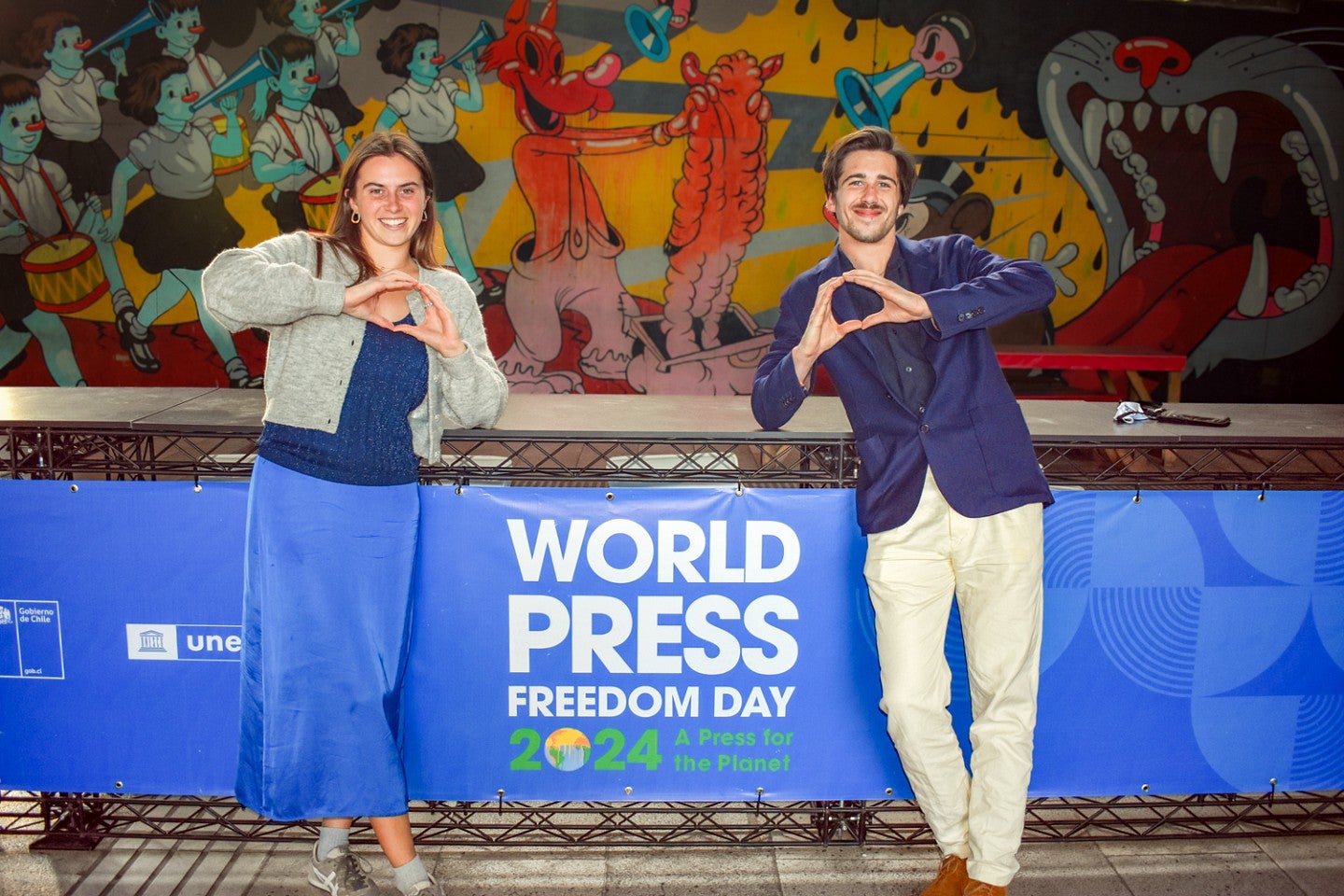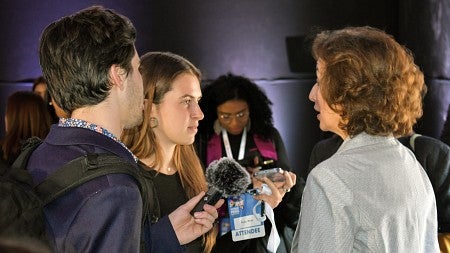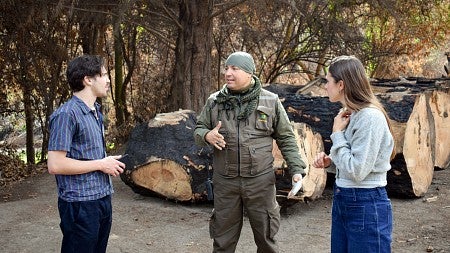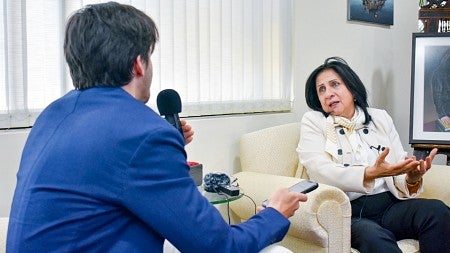Journalism students say the chance to hear from world leaders, activists at international event was ‘a responsibility and a privilege.’

The planet is on the brink of a climatic precipice: 2023 was the hottest year on record, with an average global surface temperature of 1.45 degrees Celsius higher than the preindustrial era. Other alarming records were also broken for ocean surface temperatures, sea level rise and glacier retreat. That is why this year’s theme highlights the essential link between protecting freedom of expression — a global public good — and preserving our planet.
When you think of press freedom, often what comes to mind is censorship, restricted access to news and attacks on journalists. But this year’s World Press Freedom Conference in Santiago, Chile, focused on journalism in the face of environmental crisis, and the importance of listening to youth voices.
Three students and four faculty from the UO School of Journalism and Communication (SOJC) representing the University of Oregon-UNESCO Crossings Institute for Conflict Sensitive Reporting and Intercultural Dialogue attended the conference. They were on hand to document the three-day event, which featured environmental journalism topics ranging from Indigenous communications to using social media as a tool, and speakers including the Chilean president and a 14-year-old Colombian human rights activist.
Third-year journalism student Ruby Wool said the conference offered a great opportunity to report on an international event.
“The conference was just a great experience,” said Wool, who was attending the conference for the second time. “I think the SOJC does a great job of affording students opportunities like this, and we want more students to get these opportunities.”
She was joined on the trip by fifth-year journalism student Zachary Jones Neuray, who was also attending the conference for the second time.
Since 2011, Professor Peter Laufer, James N. Wallace Chair of Journalism at the SOJC, has led a contingent of students and faculty to the event, where students report on the conference and interview speakers and participants. Their articles, podcasts and photos are published on the Crossings Institute website.
Joining Laufer and the two students on the trip was advertising Professor Chris Chávez and journalism Professor of Practice Damian Radcliffe.
Back in Eugene, Instructor Charlie Deitz managed editorial work, Communication and Media Studies Ph.D. Hadil Abuhmaid managed editing and production, Ph.D. candidate Nahla Bendefaa posted articles on the website, and SOJC staff member and past World Press Freedom Conference attendee Maxwell Ely ’23 handled social media.
Moving moments punctuate press freedom conference
Wool said she was moved by an unplanned incident that occurred during opening remarks by Chilean President Gabriel Boric. During his speech, two activists who head a news radio station in Chile interrupted the president’s remarks to draw attention to a colleague who was shot and killed while covering a conflict in Chile two years ago. They were protesting because the killer had not been brought to justice.

What impressed Wool was the interaction that unfolded as the crowd looked on.
“You could see them understanding each other and being open to dialogue,” Wool said. “The head of the media outlet was having a very informal but (serious) conversation with the president. It showed the importance of press freedom and the importance of having dialogue and conversation in open settings and feeling safe that you are not going to be forcefully removed.”
Another inspiring moment happened during a session where a panel of children and young adults discussed the importance of youth voices in the environmental movement. One panelist, 14-year-old Franciso Vera, a Colombian human and environmental rights activist, said that young people must be supported in being active agents of change.
“Public and, more importantly, decision-making spaces must represent the collective voice and not be reduced to just adults or men,” Vera told the audience. “If we are encouraged to participate in these spaces, we have the ability to generate surprising solutions and inspire progress for all.”
Nobel Peace Prize-winning journalist María Ressa discussed the importance of using data in reporting but also ensuring that statistics are humanized.

“Her words of bringing humanity and emotion to each number and not letting those numbers become this obsolete statistic that weighs on us without any real kind of resolution or real connection was incredibly emotional,” Jones Neuray said.
Reporting beyond the conference
Outside the conference halls, the SOJC group traveled around Chile to create news content for their website and UNESCO. Before they left, they brainstormed and researched potential stories around the Santiago area.
The group visited Viña del Mar, a coastal town an hour and a half away from Santiago, to cover fires that raged in the community in February. They interviewed firefighters and local community members about how the fires had impacted their lives.
“My biggest memory was sitting in the house of a woman affected by the fire,” Wool said. “She was very emotional, tearing up and breaking down. I reached out, grabbed her hand and had this human-to-human connection. It showed the importance of humanity before journalism.”
The group also talked to Nasser Abu Baker and other Palestinian journalists who were being awarded the Guillermo Award for covering Israeli aggression on the Gaza Strip. The students were invited to the Palestinian Embassy through Abuhmaid, where Jones Neuray interviewed the ambassador and president of the Palestinian Journalists Syndicate.
"Our experience at the embassy was a testament to the power of student journalism, particularly during a time when our voices have become more powerful and heard, our ability to speak to Nasser Abu Baker and Vera Baboun was one of my professional highlights and is a reminder of the responsibility and privilege that comes with the SOJC,” Jones Neuray said.

Both Wool and Jones Neuray said they were grateful for the opportunity to attend the conference two years running.
Laufer says the SOJC values the type of experiential learning this trip provided.
"This is a radical example of how we can engage at the highest level so far from home,” Laufer said. “But we can also engage in experiential learning here on campus or across the river in Springfield. Adventure and newsworthy opportunities exist, whether it’s something romantic and far away or nearby.”
—Sophie Fowler, class of ’26
Sophie Fowler is a second-year journalism major with a minor in multimedia. She is a member of the Clark Honors College and an intern with GoDucks Media and the SOJC Communication Office. You can connect with her on LinkedIn.
